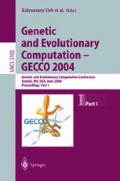Abstract
Evolutionary Algorithms (EAs) are population-based randomized optimizers often solving problems quite successfully. Here, the focus is on the possible effects of changing the parent population size. Therefore, new functions are presented where for a simple mutation-based EA even a decrease of the population size by one leads from an efficient optimization to an enormous running time with an overwhelming probability. This is proven rigorously for all feasible population sizes. In order to obtain these results, new methods for the analysis of the EA are developed.
Access this chapter
Tax calculation will be finalised at checkout
Purchases are for personal use only
Preview
Unable to display preview. Download preview PDF.
References
Jansen, T., De Jong, K.: An Analysis of the Role of the Offspring Population Size in Evolutionary Algorithms. In: Proceedings of the Genetic and Evolutionary Computation Conference (GECCO), pp. 238–246 (2002)
Jansen, T., Wegener, I.: Evolutionary Algorithms – How to Cope with Plateaus of Constant Fitness and when to Reject Strings with the Same Fitness. IEEE Transactions on Evolutionary Computation 5, 589–599 (2001a)
Jansen, T., Wegener, I.: On the Utility of Populations in Evolutionary Algorithms. Proceedings of the Genetic and Evolutionary Computation Conference (GECCO), pp. 1034–1041 (2001b)
Motwani, R., Raghavan, P.: Randomized Algorithms. Cambridge University Press, Cambridge (1995)
Rudolph, G.: How Mutation and Selection Solve Long-Path Problems in Polynomial Expected Time. Evolutionary Computation 4(2), 195–205 (1997)
Wegener, I.: Methods for the Analysis of Evolutionary Algorithms on Pseudo-Boolean Functions. In: Sarker, R., Yao, X., Mohammadian, M. (eds.) Evolutionary Optimization, pp. 349–369. Kluwer, New York (2002)
Witt, C.: Population Size vs. Runtime of a Simple EA. In: Proceedings of the Congress on Evolutionary Computation (CEC), pp. 1996–2003 (2003)
Author information
Authors and Affiliations
Editor information
Editors and Affiliations
Rights and permissions
Copyright information
© 2004 Springer-Verlag Berlin Heidelberg
About this paper
Cite this paper
Storch, T. (2004). On the Choice of the Population Size. In: Deb, K. (eds) Genetic and Evolutionary Computation – GECCO 2004. GECCO 2004. Lecture Notes in Computer Science, vol 3102. Springer, Berlin, Heidelberg. https://doi.org/10.1007/978-3-540-24854-5_76
Download citation
DOI: https://doi.org/10.1007/978-3-540-24854-5_76
Publisher Name: Springer, Berlin, Heidelberg
Print ISBN: 978-3-540-22344-3
Online ISBN: 978-3-540-24854-5
eBook Packages: Springer Book Archive

